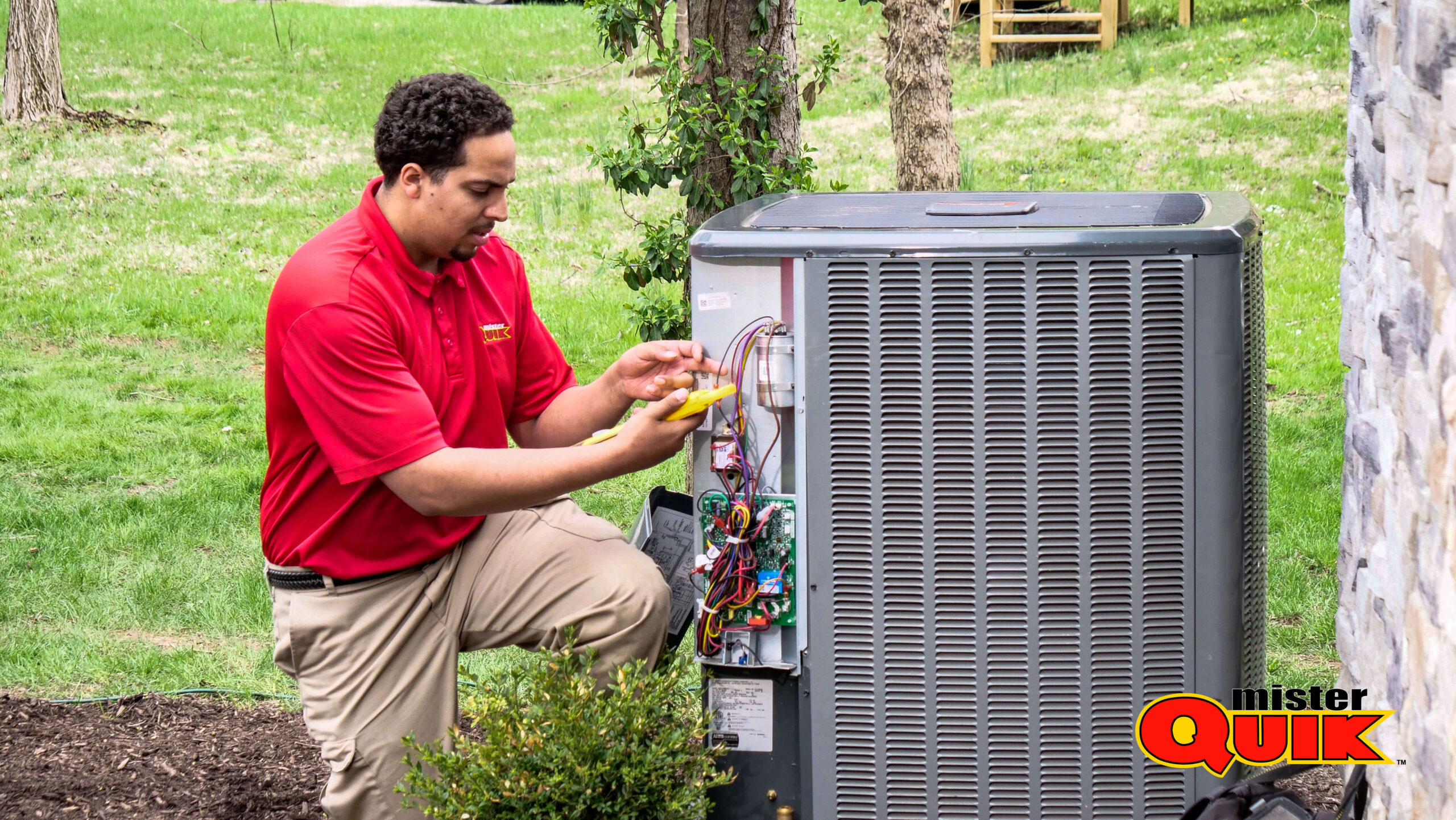Exceptional Air Handlers in Plainfield
Schedule on your own without making a call. Click the button below to get started!

Importance of Air Handler Services
Having trouble with your Plainfield Air Handler? Here’s why getting it serviced is crucial:
- Efficient Air Circulation: A properly maintained air handler ensures consistent airflow throughout your home, preventing hot or cold spots.
- Improved Indoor Air Quality: Regular servicing removes dust, allergens, and contaminants from the system, promoting healthier air for your family.
- Enhanced Energy Efficiency: Clean air handlers operate more efficiently, reducing energy consumption and lowering utility bills.
- Extended Equipment Lifespan: Routine maintenance helps prevent breakdowns and prolongs the lifespan of your Plainfield Air Handler, saving you money on costly repairs or replacements.
- Optimized Comfort: With regular servicing, your air handler can maintain optimal temperature and humidity levels, keeping your home comfortable year-round.
- Prevention of Costly Repairs: Addressing minor issues early through servicing can prevent major breakdowns, saving you from unexpected expenses.
- Peace of Mind: Knowing your Plainfield Air Handler is in top condition provides peace of mind, especially during extreme weather conditions.
- Compliance with Warranty Requirements: Many manufacturers require regular maintenance to keep warranties valid, ensuring you’re covered if any issues arise.
Don’t let air handler problems disrupt your comfort. Schedule professional services to keep your system running smoothly
What's The Difference Between An Air Conditioner And An Air Handler?
Interested in understanding the difference between an air conditioner and a Plainfield Air Handler? Here’s what sets them apart:
While an air conditioner cools the air, an air handler circulates it throughout your home.
An air conditioner includes both an outdoor condenser unit and an indoor evaporator coil, whereas an air handler is typically located indoors and contains the blower, filter, and coil.
Air conditioners are standalone units used solely for cooling, while air handlers are part of a larger HVAC system that can include heating, ventilation, and air conditioning.
Air conditioners require both indoor and outdoor units, while air handlers are usually installed indoors, often in conjunction with a heat pump or furnace.
Air conditioners and air handlers both require regular maintenance, but the specific tasks differ. Air conditioners need cleaning of outdoor coils, while air handlers require filter replacement and coil cleaning.
An air handler may seem like it is about the same thing as your furnace. It has the coils for an air conditioner, usually a filter, and a circulating fan. The one function that is different is that it does not have a way to generate heat. When you use a heat pump rather than a furnace, an air handler does warm the air.
The difference between a furnace and an air handler is that a furnace creates heat while an air handler moves air. They are two different pieces of HVAC equipment.
Yes, Technically. Not advisable. Cost — While it’s cheaper at the time to just replace part of the system, if you have to make repairs on the part you didn’t replace or end up replacing the 2nd part at a later date it will end up costing more than it would have to replace the entire system.
Although there are multiple ways and places you can install an air handler, the unit connects to the rest of your home through a series of supply and return ventilation ducts that recirculate the air in each room.
What Does An Air Handler Do?


Wondering about the role of a Plainfield Air Handler? Here’s what it does:
- Air Circulation: The air handler is responsible for circulating air throughout your home, ensuring consistent airflow in every room.
- Temperature Regulation: It works with your heating and cooling systems to regulate indoor temperatures, keeping your home comfortable year-round.
- Air Filtration: The air handler contains filters that capture dust, allergens, and other particles, improving indoor air quality.
- Humidity Control: In conjunction with your HVAC system, the air handler helps maintain optimal humidity levels for comfort and health.
- Fan Operation: The blower fan in the air handler distributes conditioned air from your HVAC system into the ductwork for delivery to different areas of your home.
- Compatibility: Plainfield Air Handlers can be integrated with various heating and cooling systems, including heat pumps and air conditioners, for comprehensive climate control.
- Maintenance: Regular servicing of the air handler is essential to ensure efficient operation, prevent breakdowns, and prolong its lifespan.
Knowing how your Plainfield Air Handler works can help you spot problems and keep your home cozy. If you encounter issues, it’s smart to promptly seek expert help to fix them and get your system running smoothly again.
Is An Air Handler Necessary?
Perhaps you are asking if you really need a Plainfield Air Handler. Here’s why it’s essential:


An air handler ensures consistent airflow throughout your home, preventing hot or cold spots.


It filters out dust, allergens, and pollutants, promoting healthier indoor air for you and your family.


Works with your HVAC system to regulate temperature, keeping your home comfortable year-round.
What Are Some Signs You Need A New Air Handler?
When is it time for you to have a new Plainfield Air Handler? Look out for these signs:
Inconsistent Airflow: Uneven cooling or heating throughout your home could indicate a failing air handler.
Strange Noises: Unusual sounds like banging, rattling, or squealing coming from the air handler may signal mechanical issues.
Frequent Breakdowns: If your Plainfield Air Handler requires frequent repairs, it may be more cost-effective to replace it.
Old Age: Air handlers typically last around 10-15 years. If yours is reaching this age or older, it might be time for a replacement.
Increased Energy Bills: A decline in efficiency can lead to higher energy costs. If your bills are rising without explanation, your air handler could be to blame.
Poor Air Quality: Dusty or musty smells, along with increased allergens in the air, could indicate a failing air handler.
Visible Damage: Physical damage, such as rust, corrosion, or leaks around the air handler, suggests it may be time for a new one.
Recognizing these signs can help you decide if it’s time to replace your Plainfield Air Handler. Seeking professional assistance can ensure accurate diagnosis and timely resolution of any issues.
Do You Need To Replace An Air Handler If You Replace An AC Unit Or Furnace?
Concerned about replacing your Plainfield Air Handler alongside your AC unit or furnace? Here’s what to consider:
In many cases, it's advisable to replace the air handler when upgrading other components to ensure compatibility and optimize performance.
Newer HVAC systems are often designed to work together for maximum efficiency. Replacing only one component may compromise overall efficiency.
If your air handler is old or experiencing issues, it may be wise to replace it with an AC unit or furnace to avoid future problems.
Some warranties may require replacing all components simultaneously to remain valid, protecting your investment in the long term.
While replacing multiple components may seem costly upfront, it can save you money on repairs and energy bills in the long run.
Considering these factors can help you make an informed decision about whether to replace your air handler when upgrading other HVAC components. It’s essential to prioritize the long-term efficiency and reliability of your system for optimal comfort in your home.
Troubleshoot Checklist:
- Check for blocked vents or duct obstructions.
- Ensure the air handler’s fan is functioning correctly.
- Listen for any unusual sounds such as banging or rattling.
- Inspect the air handler for loose components or worn-out parts.
- Keep track of how often repairs are needed.
- Consider the age of the Plainfield Air Handler and its maintenance history.
- Monitor utility bills for sudden spikes in energy consumption.
- Assess the efficiency of the air handler and HVAC system as a whole.
- Notice any changes in indoor air quality like musty odors or increased dust.
- Check air filters and ensure they’re clean and properly installed.







